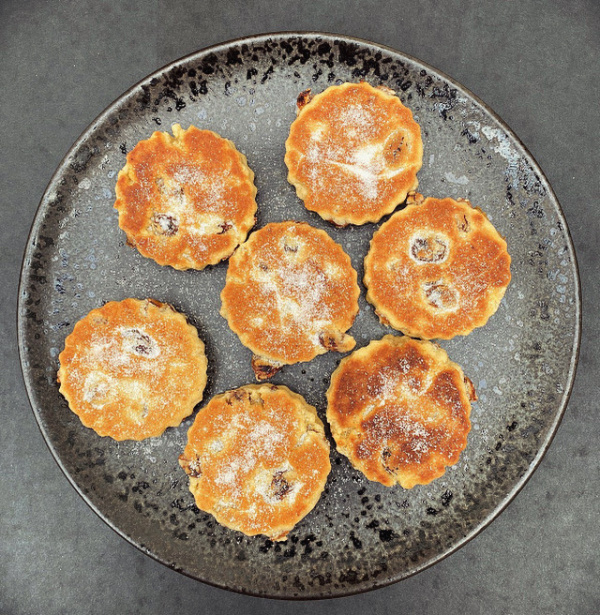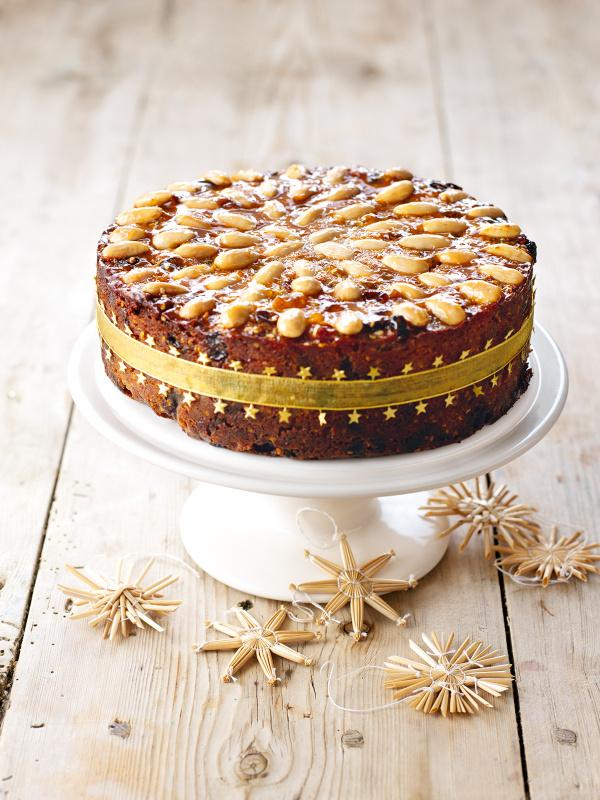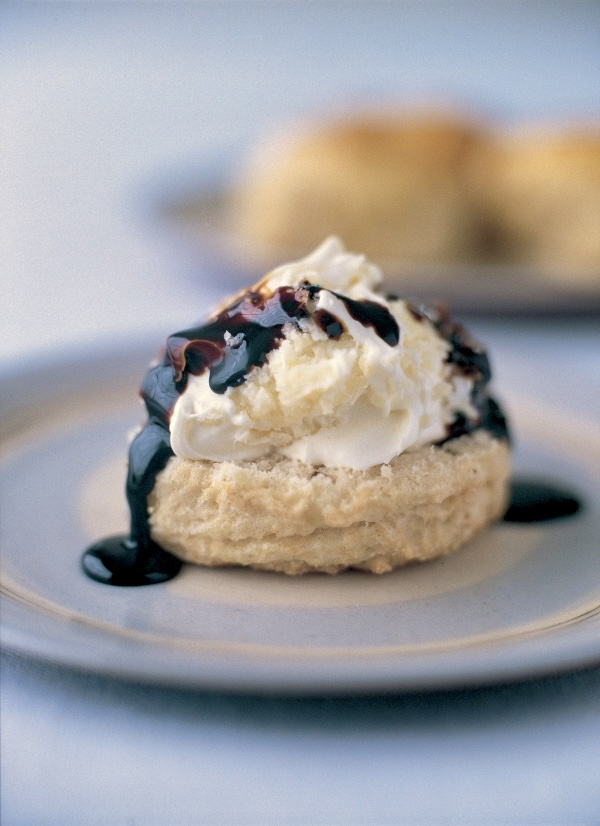Welsh Cakes
by Nigella. Featured in HOW TO BE A DOMESTIC GODDESSIntroduction
I feel that if I’m talking about Welsh Cakes, I should really introduce them first by their proper, Welsh name, Picau ar y maen, which simply means “cakes on the stone”, and the stone being the flat griddle they are traditionally cooked on. I use a rather more modern smooth (and lightweight) griddle for mine, but a thick-bottomed frying pan or skillet is just as good. These little cakes hold a special place in my heart: they came into my life along with one Heulwen Williams a quarter of a century ago; she made me her grandmother’s version, and then let me have the recipe for my second book. All I’ve changed really from that recipe is the flour. The original recipe stipulated self-raising flour, whereas I prefer to use plain/ all-purpose flour and add the baking powder as below. Feel free to use self-raising flour if you prefer.
But perhaps I’m getting ahead of myself. For those who’ve never eaten them, I should perhaps give a brief explanation of what they are, and I can best describe them as a cross between shortbread biscuits/cookies and pancakes — of course, they are pancakes of a sort — or a flat disc of fruited scone. They are modest and unfancy, and one of the best accompaniments to an afternoon cup of tea I can think of. I know some people apparently eat them spread with butter and jam, but I’ve only ever come across them or eaten them simply sprinkled with sugar.
It is possible to make them gluten free, though you do need to eat them fast, as they taste good only when still warm from the griddle pan; once cold they are too dry and rather sawdusty. And for the gf option I do recommend sticking to self-raising flour, as for some reason the gluten free flour I get has xanthan gum (which helps make up for the lack of gluten) only in the self-raising version. Still, they are inevitably more fragile to cook, so take extra care on turning them.
I feel that if I’m talking about Welsh Cakes, I should really introduce them first by their proper, Welsh name, Picau ar y maen, which simply means “cakes on the stone”, and the stone being the flat griddle they are traditionally cooked on. I use a rather more modern smooth (and lightweight) griddle for mine, but a thick-bottomed frying pan or skillet is just as good. These little cakes hold a special place in my heart: they came into my life along with one Heulwen Williams a quarter of a century ago; she made me her grandmother’s version, and then let me have the recipe for my second book. All I’ve changed really from that recipe is the flour. The original recipe stipulated self-raising flour, whereas I prefer to use plain/ all-purpose flour and add the baking powder as below. Feel free to use self-raising flour if you prefer.
But perhaps I’m getting ahead of myself. For those who’ve never eaten them, I should perhaps give a brief explanation of what they are, and I can best describe them as a cross between shortbread biscuits/cookies and pancakes — of course, they are pancakes of a sort — or a flat disc of fruited scone. They are modest and unfancy, and one of the best accompaniments to an afternoon cup of tea I can think of. I know some people apparently eat them spread with butter and jam, but I’ve only ever come across them or eaten them simply sprinkled with sugar.
It is possible to make them gluten free, though you do need to eat them fast, as they taste good only when still warm from the griddle pan; once cold they are too dry and rather sawdusty. And for the gf option I do recommend sticking to self-raising flour, as for some reason the gluten free flour I get has xanthan gum (which helps make up for the lack of gluten) only in the self-raising version. Still, they are inevitably more fragile to cook, so take extra care on turning them.

Share or save this
Ingredients
Makes: approx. 20
- 250 grams plain flour plus extra for rolling out (see intro)
- 2½ teaspoons baking powder
- ⅛ teaspoon fine sea salt
- 125 grams cold unsalted butter
- 75 grams caster sugar (plus more for sprinkling)
- ¼ teaspoon ground allspice
- 100 grams sultanas
- 1 large egg (cold from the fridge)
- milk (as needed)
- 2 cups all-purpose flour plus extra for rolling out (see intro)
- 2½ teaspoons baking powder
- ⅛ teaspoon fine sea salt
- 8 tablespoons cold unsalted butter
- ⅓ cup granulated sugar (plus more for sprinkling)
- ¼ teaspoon ground allspice
- ⅔ cup golden raisins
- 1 large egg (cold from the fridge)
- milk (as needed)
Method
You will need a 6cm /2½ inch crinkled round cookie cutter.
- Mix the flour, baking powder (though you won’t need the baking powder if you’re using self-raising flour) and salt together in a large bowl.
- Cut the cold butter into approximately 1cm/½ inch dice and toss into the flour. Rub the butter into the flour as if you were making a crumble. You can do this either with your fingers, a pastry blender, or in a freestanding mixer with the paddle (or pastry beater) fitted. Whichever method you’re using, you should end up with a soft sandy mixture, with a few larger crumbs.
- Add the sugar, allspice and sultanas and mix into the flour, and then beat the cold egg in a small jug before pouring into the bowl, and carry on mixing until you have a dough. This takes perhaps more time than you might expect. Be patient and wait for it to start clumping first into small pieces and then into two or three pieces of coherent dough. If this doesn’t happen, by all means add a little milk, but trickle it in very slowly as you don't want it to get too liquid or sticky. Squidge the pieces of dough together and keep squidging and squishing as you form a disc. Wrap this and put in the fridge to rest for 15-20 minutes.
- Roll out the dough on a lightly floured surface to a thickness of ½ cm / ¼ inch. Dip your 6cm / 2½ inch crinkled cutter into some flour then stamp out your Welsh Cakes. Squidge the offcuts together and reroll until you have used up all your dough. It is very forgiving so roll and reroll as necessary.
- Preheat a griddle or cast-iron frying skillet (don’t add any oil) and cook the cakes for 3 to 4 minutes a side. The only difficult thing is getting the heat right: it needs to be low enough so that the outsides don’t burn before the middle is cooked. I prefer (for once) to proceed a little more cautiously at low heat for 4 minutes before first turning them. Lift one up first and look underneath: it should not feel too soft to flip and the bottom should be a deep gold. Don’t worry if the middle looks just a little squidgy when both sides are cooked and golden brown, as the Welsh Cakes will firm on standing. But do stay hovering over the pan, as it will get hotter as you progress and the flame will need adjusting as you go.
- As they’re ready, transfer the Welsh Cakes to a platter or plates and sprinkle generously straightaway with caster sugar. Serve immediately, as Welsh Cakes, like scones, need to be enjoyed freshly cooked. You can eat them cooled, but for me, they are best warm. However, I don’t advise eating them hot from the griddle as they do need 3-5 minutes to settle and firm up. But should you be making these with gluten free flour, then ignore what I’ve just said, and eat them as soon after they’re off the griddle as you can. Any more than 5 minutes standing and all is lost.
You will need a 6cm /2½ inch crinkled round cookie cutter.
- Mix the flour, baking powder (though you won’t need the baking powder if you’re using self-raising flour) and salt together in a large bowl.
- Cut the cold butter into approximately 1cm/½ inch dice and toss into the flour. Rub the butter into the flour as if you were making a crumble. You can do this either with your fingers, a pastry blender, or in a freestanding mixer with the paddle (or pastry beater) fitted. Whichever method you’re using, you should end up with a soft sandy mixture, with a few larger crumbs.
- Add the sugar, allspice and golden raisins and mix into the flour, and then beat the cold egg in a small jug before pouring into the bowl, and carry on mixing until you have a dough. This takes perhaps more time than you might expect. Be patient and wait for it to start clumping first into small pieces and then into two or three pieces of coherent dough. If this doesn’t happen, by all means add a little milk, but trickle it in very slowly as you don't want it to get too liquid or sticky. Squidge the pieces of dough together and keep squidging and squishing as you form a disc. Wrap this and put in the fridge to rest for 15-20 minutes.
- Roll out the dough on a lightly floured surface to a thickness of ½ cm / ¼ inch. Dip your 6cm / 2½ inch crinkled cutter into some flour then stamp out your Welsh Cakes. Squidge the offcuts together and reroll until you have used up all your dough. It is very forgiving so roll and reroll as necessary.
- Preheat a griddle or cast-iron frying skillet (don’t add any oil) and cook the cakes for 3 to 4 minutes a side. The only difficult thing is getting the heat right: it needs to be low enough so that the outsides don’t burn before the middle is cooked. I prefer (for once) to proceed a little more cautiously at low heat for 4 minutes before first turning them. Lift one up first and look underneath: it should not feel too soft to flip and the bottom should be a deep gold. Don’t worry if the middle looks just a little squidgy when both sides are cooked and golden brown, as the Welsh Cakes will firm on standing. But do stay hovering over the pan, as it will get hotter as you progress and the flame will need adjusting as you go.
- As they’re ready, transfer the Welsh Cakes to a platter or plates and sprinkle generously straightaway with granulated sugar. Serve immediately, as Welsh Cakes, like scones, need to be enjoyed freshly cooked. You can eat them cooled, but for me, they are best warm. However, I don’t advise eating them hot from the griddle as they do need 3-5 minutes to settle and firm up. But should you be making these with gluten free flour, then ignore what I’ve just said, and eat them as soon after they’re off the griddle as you can. Any more than 5 minutes standing and all is lost.
Additional Information
MAKE AHEAD / STORE:
Leftovers can be stored in an airtight container in a cool place for up to 5 days. Reheat in a microwave for 10-20 seconds or in an oven heated to 180°C/160°C Fan/350°F for 5 minutes. But don’t expect them to be quite like they are first time out.
Leftovers can be frozen in a resealable bag for up to 3 months. Thaw for 1-2 hours at room temperature and reheat as above.
You can make the dough, roll and cut out the welsh cakes and refrigerate for a day if you need. Take them out of the fridge in time to lose a bit of chill before griddling them.
MAKE AHEAD / STORE:
Leftovers can be stored in an airtight container in a cool place for up to 5 days. Reheat in a microwave for 10-20 seconds or in an oven heated to 180°C/160°C Fan/350°F for 5 minutes. But don’t expect them to be quite like they are first time out.
Leftovers can be frozen in a resealable bag for up to 3 months. Thaw for 1-2 hours at room temperature and reheat as above.
You can make the dough, roll and cut out the welsh cakes and refrigerate for a day if you need. Take them out of the fridge in time to lose a bit of chill before griddling them.






Tell us what you think
Thank you {% member.data['first-name'] %}.
Explore more recipesYour comment has been submitted.
What 2 Others have said
-
Posted by TomMo91 on 18th June 2023
-
Posted by hollis517 on 12th October 2022
Show more commentsNigella, I just made these and as a Swansea lad born and raised I can confirm they're fantastic! I've had a real hankering for Welsh cakes lately, but I'm living in England at the moment and it's impossible to find nice ones here. These more than scratched the itch :) thank you! (I went a bit heavier on the all-spice, about a teaspoon, since I have the cheap low quality stuff)
Welsh cakes spread with homemade clotted cream and accompanied by a cup of strong black coffee or Karak chai would be amazing!